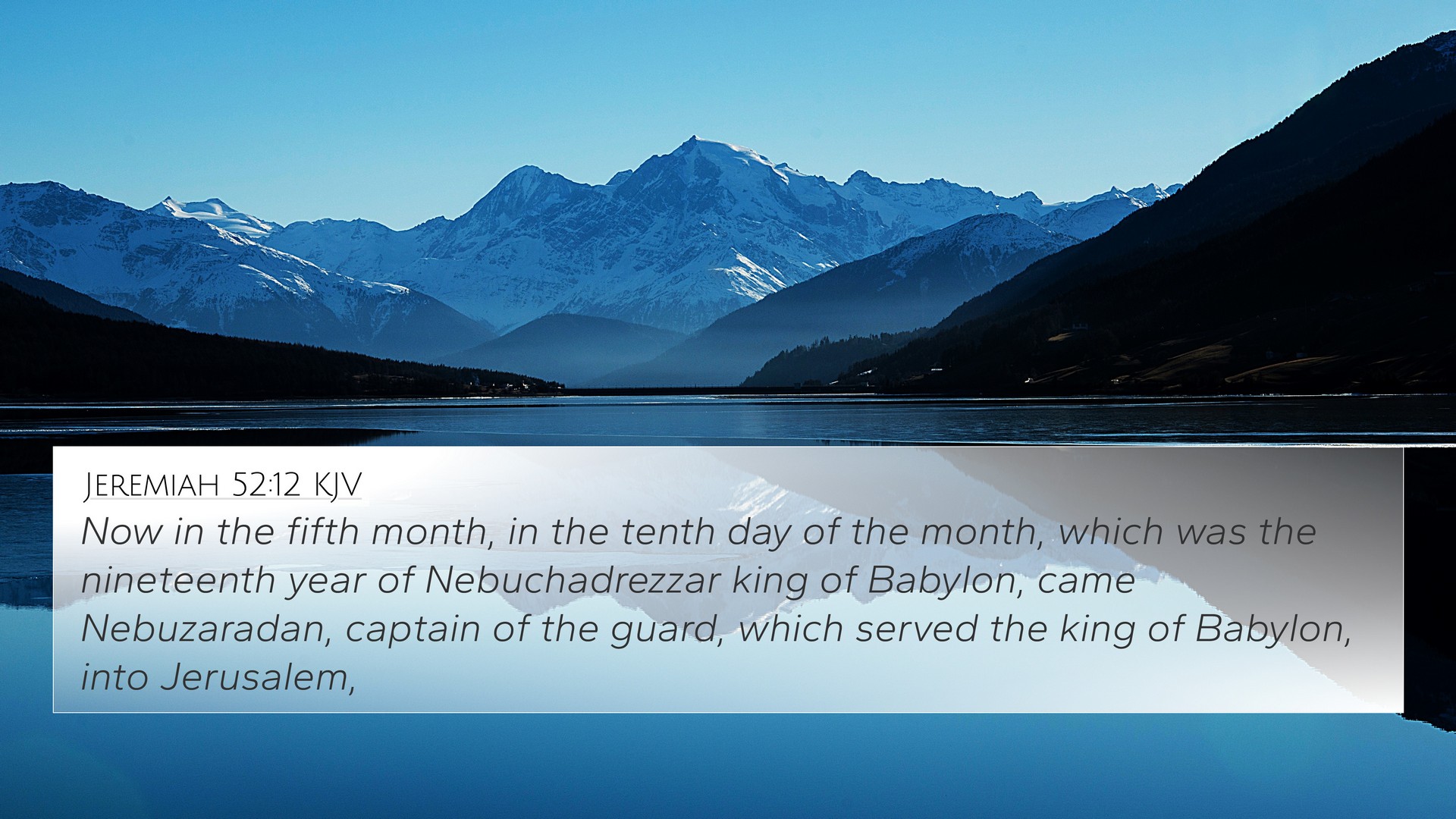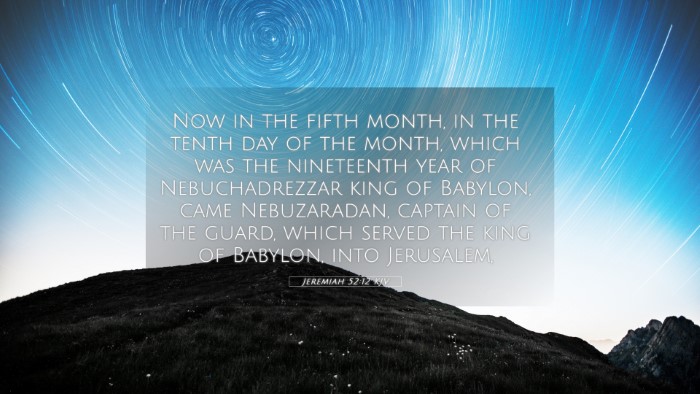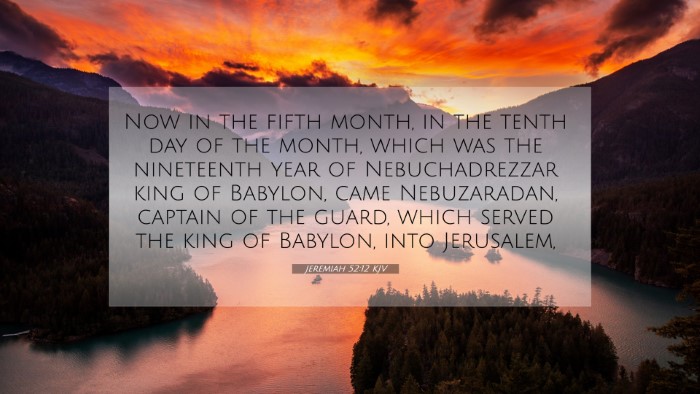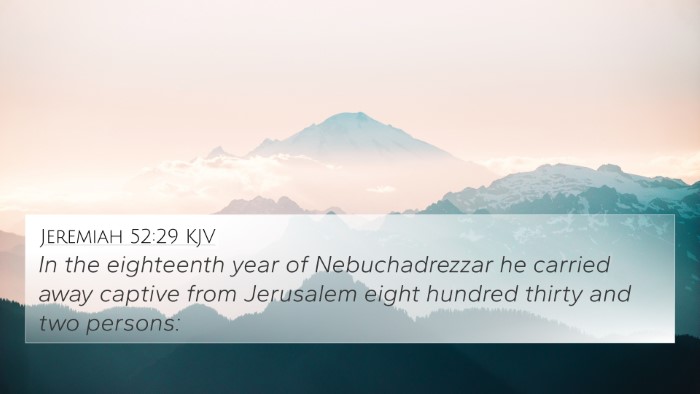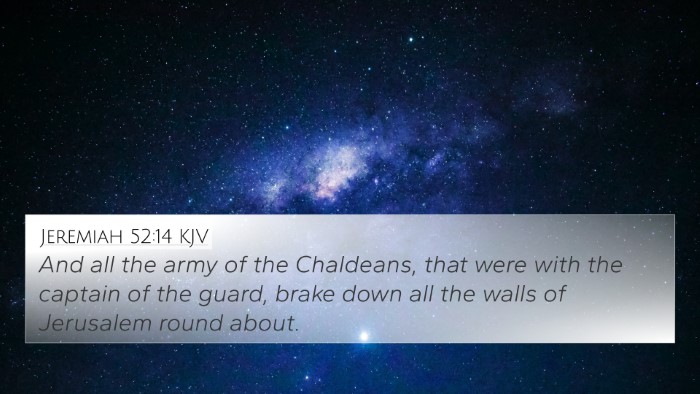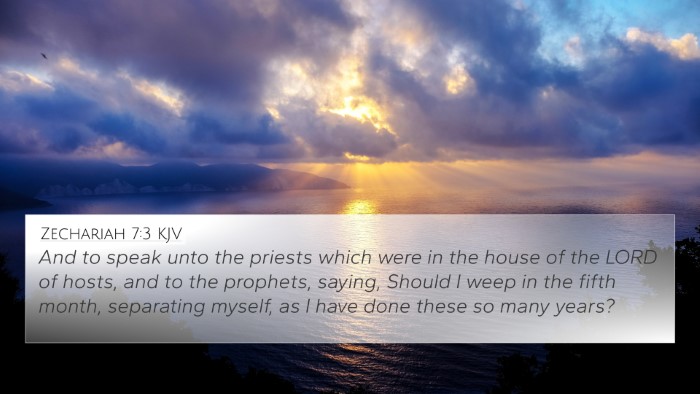Understanding Jeremiah 52:12
Verse Context: Jeremiah 52:12 states, "Now in the fifth month, in the tenth day of the month, which was the nineteenth year of Nebuchadnezzar king of Babylon, came Nebuzaradan, captain of the guard, which served the king of Babylon, unto Jerusalem."
Summarized Meaning
This verse marks a pivotal moment in the history of Israel, specifically within the context of the Babylonian conquest of Jerusalem. The historical recounting signifies the total devastation and the end of the Jerusalem kingdom.
Historical Significance
This event detailed in Jeremiah 52:12 aligns with the prophecy given throughout the book of Jeremiah, designating the fall of Jerusalem as an act of divine judgment. The involvement of Nebuzaradan as the captain of the guard illustrates the Babylonian authority and the cessation of Jewish autonomy.
Insights from Public Domain Commentaries
- Matthew Henry: Henry emphasizes the sorrow and tragedy of Jerusalem's fall. He reflects on the consequences of turning away from God, highlighting that this destruction was not merely military but a spiritual and symbolic defeat of Israel's covenant with Yahweh.
- Albert Barnes: Barnes elaborates on the date specified in the verse, pointing out that it serves to authenticate the event historically. He indicates that God's hand was in allowing this calamity due to Israel's unfaithfulness.
- Adam Clarke: Clarke offers a perspective on the Babylonians' motives, detailing how Nebuchadnezzar sought to demonstrate his dominance fully. He notes the significance of the timing, reinforcing that God's prophecies stand fulfilled at the appointed season.
Cross-References for Further Study
This verse can be linked to several other scriptures, illustrating the themes of judgment, destruction, and the faithfulness of God to His word. Here are some related passages:
- Jeremiah 39:2 - Describes the fall of Jerusalem, giving more context to the siege.
- 2 Kings 25:8-10 - Chronicles the account of the Babylonian destruction in detail.
- Lamentations 1:1-2 - Expresses the desolation of Jerusalem post-destruction.
- Ezekiel 33:21 - Reflects on the prophetic warnings leading up to the fall.
- Isaiah 39:6-7 - Forecasts the Babylonian captivity through prophetic utterance.
- Daniel 1:1 - Indicates the beginning of Babylonian rule over Jerusalem.
- Zechariah 1:16 - Offers a glimpse of hope and restoration post-destruction.
Thematic Connections
Jeremiah 52:12 reveals deep theological themes through its historical narrative, particularly concerning:
- Judgment and Redemption: The fall signifies a period of judgement but also paves the way for eventual redemption.
- Hope in Despair: Despite the destruction, the prophetic books offer glimpses of hope for the future restoration of Israel.
- The Sovereignty of God: God's sovereign control over nations and history is evident, suggesting that even devastation serves His ultimate purpose.
Application and Reflection
Understanding the implications of Jeremiah 52:12 is crucial for recognizing the consequences of disobedience to God. Some practical applications include:
- Self-Reflection: Assess one's personal relationship with God, ensuring faithfulness amidst challenges.
- Biblical Lessons: Learn from Israel's history to avoid similar pitfalls of neglecting devotion.
- Hope in God's Plans: Trust in God's promise of restoration despite current circumstances.
Cross-Referencing Insights
The linkage of Jeremiah 52:12 to other scriptures enhances understanding. Utilizing tools for Bible cross-referencing like a Bible concordance can lead to deeper study and greater awareness of how various texts inform one another. Methods such as Bible chain references enable believers to see the interconnectedness of scripture.
Conclusion
In summary, Jeremiah 52:12 serves as a crucial reminder of God's sovereignty, the consequences of national sin, and the hopeful assurance of future restoration. By engaging in cross-referencing Bible study, believers can uncover the richness of scripture and understand the intricate connections woven throughout the Bible.
